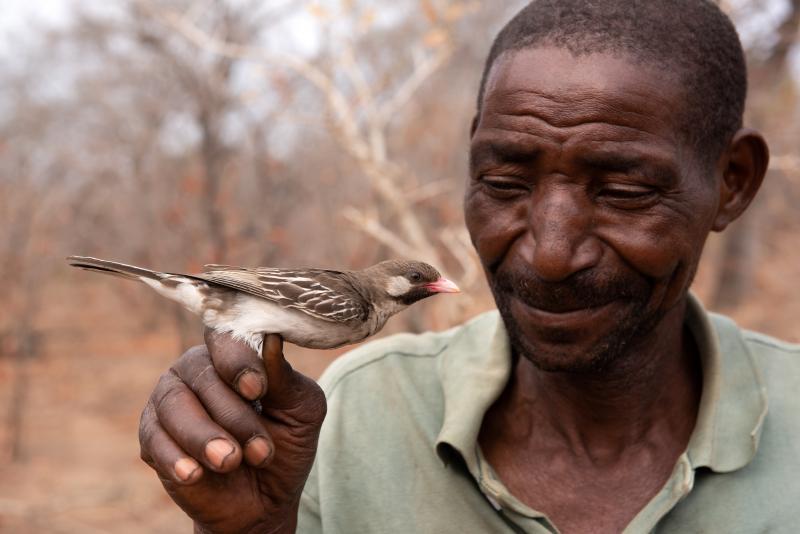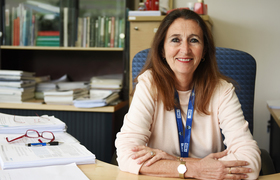Evolutionary ecologist enters prestigious Royal Society Fellowship fold
04 July 2025 | Story Hishamodien Hoosain. Read time 8 min.-Landscape.jpg)
Adding to a cohort of excellent researchers is the University of Cape Town’s (UCT) Professor Claire Spottiswoode. She is one of over 90 outstanding researchers from across the world who have been elected this year to the Fellowship of the Royal Society, the United Kingdom’s national academy of sciences. This esteemed group includes trailblazers across a wide range of fields. Their achievements represent the very best of scientific endeavour, from basic discovery to research with real-world impact.
The strength of the fellowship lies not only in individual excellence but also in the diversity of backgrounds, perspectives and experiences each new member brings, representing the truly global nature of modern science. This year's cohort includes fellows elected from countries such as South Africa, China, Switzerland, Singapore and Malaysia.
Among the distinguished individuals welcomed into the fellowship is Professor Spottiswoode, based at UCT’s Faculty of Science. She is a South African evolutionary ecologist studying birds in Africa and joins five fellows of the Royal Society from UCT.
“My work, together with my colleagues, focuses on the ecology and evolution of interspecies interactions such as parasitism, predation and mutualism. When species interact and evolve in response to one another – that’s to say, coevolve – the result can be rapid and ever-shifting evolution, shaping some of the most beautiful adaptations seen in nature,” explained Spottiswoode.
“I study some of these interactions through fieldwork on African birds together with many wonderful students and other collaborators from Africa and around the world. I’m bowled over by the Royal Society’s recognition for research that’s been a delight to do.”
At UCT, Spottiswoode is the Pola Pasvolsky Chair in Conservation Biology at the FitzPatrick Institute of African Ornithology in the Department of Biological Sciences and co-director of the Max Planck–University of Cape Town Centre for Behaviour and Coevolution. The FitzPatrick Institute is one of UCT’s oldest University Research Committee-accredited research groupings, part of the Department of Biological Sciences (then Zoology) since 1973. Spottiswoode is one of two National Research Foundation A-rated researchers based there.
Institute director, Associate Professor Susie Cunningham, said: “We are absolutely delighted that Claire has been recognised in this way – this honour is incredibly well-deserved. Claire is beloved in our institute not just for the world-leading quality of her work, but also for her kind, collegial and inclusive attitude and her dedicated mentorship of her students and junior colleagues. She’s a superb scientist and role model and we’re proud to have her as our colleague at the Fitz.”
“If I have learnt anything these last couple of decades, it is that science truly does thrive on diversity and needs more than just scientists.”
Evolutionary interactions between species
Spottiswoode's research asks how interactions between different species influence the evolution of both genetic and cultural biodiversity. Her work is strongly rooted in field observations and experiments, carried out in close and long-term collaboration with communities in southern Zambia and northern Mozambique, in particular.

“Research is always a team effort and this big honour is also recognition for the many people who shared in this work, including the communities in Zambia, Mozambique and South Africa who make all our findings together possible – and immensely enjoyable. If I have learnt anything these last couple of decades, it is that science truly does thrive on diversity and needs more than just scientists.”
Her research covers the ecology and evolution of both antagonism and mutualism – how and why species exploit or cooperate with other species.
Coevolutionary arms between brood parasites and their hosts
For over two decades she has studied coevolution between brood-parasitic birds and the hosts they exploit to raise their young. Many brood-parasitic birds beautifully mimic the eggs of their hosts, to trick host parents into accepting the imposter egg as one of their own. Spottiswoode’s work in the field in Zambia has shown how such coevolutionary arms races can escalate to drive signals of identity encoded in beautiful and diverse markings on eggshells.
%20in%20outer%20circle%2C%20cuckoo%20finch%20(parasite)%20in%20middle%20circle%20.jpg/Egg%20signatures%20and%20forgeries%2C%20in%20Zambia%20%E2%80%93%20tawny-flanked%20prinia%20(host)%20in%20outer%20circle%2C%20cuckoo%20finch%20(parasite)%20in%20middle%20circle%20__599x600.jpg)
Hosts try to escape mimicry by evolving new egg types (signatures) but are constantly pursued by reciprocal evolution of egg markings in the parasite (forgeries). Together with collaborators, she has also shown how, in turn, selection for egg mimicry has shaped ancient genetic diversification only among females within parasite species that exploit multiple hosts.
Cooperation between people and wild birds
In addition to parasitism, she is fascinated by mutualistic interactions, in which both interacting species benefit. “Evolution has shaped a world as rich with mutual benefit as it is with exploitation,” said Spottiswoode.
She and her team study the remarkable mutualism between human honey-hunters and Greater Honeyguides in Mozambique and elsewhere in eastern Africa. This cooperative relationship involves beeswax-eating birds leading people to wild bees’ nests so they can subdue the bees and open the nest, exposing beeswax for the honeyguides and honey for the humans.
“People have been following honeyguides for probably at least as long as we’ve been human. It’s a joy to study this rare example of cooperation between our own species and a free-living wild animal, as a window into the evolution of mutualism and communication between species,” she said.
The team’s work has helped demonstrate that honeyguides know the local human community’s specific honey-hunting signals that vary culturally across Africa, benefitting both species. It has also shown how interspecies cooperation both affects and is affected by ecology and culture. This research is conducted in close collaboration with honey-hunting communities and conservation organisations, particularly the Niassa Carnivore Project.
Speaking to recognition she said: “This feels particularly poignant right now, as our honey-hunter and conservationist collaborators and friends in Mozambique are imperilled by armed attacks in the Niassa Special Reserve – an extraordinary place where cooperation between honeyguides and people still flourishes.”
Through this work she has received several awards including the Scientific Medal of the Zoological Society of London, the Bessel Research Award of the Alexander von Humboldt Foundation, and the Gill Memorial Medal of BirdLife South Africa. Her election to the Fellowship of the Royal Society acknowledges her significant contributions to understanding complex ecological and evolutionary interactions.
 This work is licensed under a Creative Commons Attribution-NoDerivatives 4.0 International License.
This work is licensed under a Creative Commons Attribution-NoDerivatives 4.0 International License.
Please view the republishing articles page for more information.










